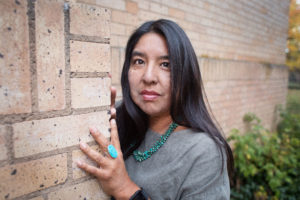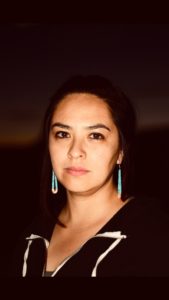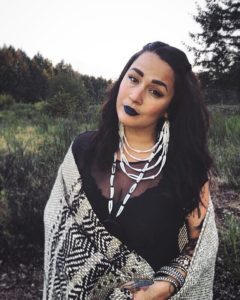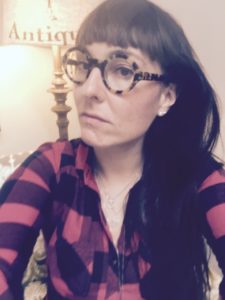
New Poetry by Indigenous Women
Featuring Esther G Belin, Paige Buffington, Sasha LaPointe, and Erika T. Wurth.
Curated by Natalie Diaz
In my Mojave culture, many of our songs are maps, but not in the sense of an American map. Mojave song-maps do not draw borders or boundaries, do not say this is knowable, or defined, or mine. Instead our maps use language to tell about our movements and wonderings (not wanderings) across a space, naming what has happened along the way while also compelling us toward what is waiting to be discovered, where we might go and who we might meet or become along the way.
This feature of indigenous women is meant to be like those song-maps, to offer myriad ways of “poetic” and linguistic experience—a journeys through or across memory, or imagination, across pain or joy or the impossibility of each, across our bodies of land and water and flesh and ink—an ever-shifting, ever-returning, ever-realizing map of movement, of discovery, of possibility, of risk—of indigenous and native poetry. It is my luck to welcome you to this indigenous space and invite you into the conversations of these poems, languages, imageries and wonders. In this installment of the bi-monthly feature, I’m pleased to share the work of Esther G Belin, Paige Buffington, Sasha LaPointe, and Erika Wurth (full bios below).
–’Ahotk, Natalie Diaz
*

ESTHER G BELIN
The Winter Pantry
New Year falls in the middle of a blizzard
gales of razor-edged snowflakes forming
mounds, the impression of earth resting
sleeping like an elder
purifying pockets of air
sacrarium creation stories
harvesting winter
Grocery list:
adequate yearly progress
measurements
standardized insertions
simulated tests
cedar-filled sachets
snow-drift blessings
the seasonal workers forming
single-file lines, their expression
drafted into another 6-pack packaged
and warehoused within pliable aluminum walls
the ingestion of tin can meals
asphyxiation with gas-permeable coating
compact
irradiated
sustenance
fills the winter
pantry, an assembly
of snowflakes within the blizzard
the crease in the origami
dollar bill paper crane
scars the stomach
lining, a benumbed tumble along the spine
a rearranged synapse, razor-edged
surge, obedient like the Indian Agent
issuing rations
Sconce
We could see some mountain I didn’t know the name of where some adventures had recently gone to… Dean Young, “A Student in the Distant Land”
We could see some mountain I didn’t know
only heard the name repeated several times
in a tribal tongue I could not speak
but rather spit the syllables, like a
a non-sensical special place, like
uncovering a child’s
hidden handiwork
Today I will use those words, not just repeat them
like they make you do in school
Today those words will save my life
I will stand in front of an audience where no one
speaks the saliva-weighted lingua, then
I will tell the story of one tribe and how
we all came to be sitting in this one room
at this particular time, babbling on a blabber
like freshly creamed buttery smooth
vernacular, sonical chimes massaging the vertebrae
erotic, erudite as low tide observations
and now we all just go with the flow
of the ocean’s great rhythm
splash, splash, splashy, crash
splash, splash, splashy, crash
crash, splashy, splash
![]()

PAIGE BUFFINGTON
At the Red Lights
With hands wrapped around a motionless steering wheel,
all white-knuckled and near shaking,
dad pressed his polished boot into the brake,
stomped with the other too near
the gas pedal I wondered
what places he had to get to,
what sort of business my hometown’s neon offers white-
collared men, wondered
why he chose to stay here.
At this standstill, we watched
a group dance across the street,
move a gold, liquid sun between bandaged and
rope-burnt hands.
One man tipped the bottleneck toward a headlight-lit
wound, we watched gold
fill the purple reservoir
splitting his cheek in two I watched a tooth
fall, my dad shake his head, heard him mutter while I
traced the man’s cross country build, this figure
with my fingers, wondered
which distance he ran in his youth, the six
mile muddied path behind the truck stops,
or the thirty mile run from Zuni into town I
recognized a face beneath one hood,
her profile like lightning I once traced
the initials needle-dotted behind
her ear in Junior High, studied its pattern when she moved
this curtain, this rivering
of long black hair I
thought of canyon’s watermarks, hoped
the fading letters belonged to her grandmother’s name or
a scripture similar to that I
watched her throw her head back in laughter,
that same hair shining with traffic light—I
wished them a safe place to sleep—
wished for them to head home soon.
I wished for the red light to switch to green.
I hoped this hiss heard between the stomping was something in the car,
not my father’s muttering, hoped it was
the engine rattling—
or an animal even,
a snake or cottontail my dad found, maybe
one he injured or caught on the hike we were coming from.
I asked him if he counted the rooms of Chaco Canyon,
to tell me of swamplands, his childhood—
but didn’t care if he counted,
didn’t care how many of Pueblo Bonito’s rock rooms opened
for the Southwest’s deep purple sky I
believed in their secrets, but didn’t want to hear his hissing,
or about the animals he placed in coffee cans,
didn’t want to picture them coiled and uncoiling
themselves to shake grinds out of scales,
didn’t want to know how long they lived
outside the reeds and waterways they were pulled from—
But this thought of water,
of sun-warmed bellies, the winding pattern snakes leave in river sand
led me to think of the weekend before,
how softly this fighter from the valley said he had things to show me,
the precision with which he pulled a pocketknife
from a pressed shirt pocket to cut
an apple still green and bruised
with wild into crescents—
how softly he placed the pieces on my tongue,
hands shaking as if he were going to break
them with his calloused, barbed-wire cut hands, softly as if
they were moon-shaped gems pulled straight from the sky—
And with these same hands he showed me how to throw
punches at ghosts by the river, how to get an enemy
to the ground, the ways you twist
their bodies around your chest, he threw
me over his shoulder to run his hands up the Achilles,
from the curves of the calf up and up—
And from this riverbank
he led me to a one-bedroom house
to meet his grandfather,
to sit on the bed they still shared
and asked me to read to him, to them, to stop—
to repeat the words like cedar and meadow, cicada.
Cicada, cicada, their voices rang out after mine I
told them we believed the iron-shelled, winged insects shielded
the people from arrows when we were moving up, up into
this shining world, the grandfather
said Yes. I think I’ve seen those scars—
My father pressed the gas at the click of the lights—
asked why I asked about abandoned canyons I
said that I remembered reading about something,
or maybe I told him that I was only curious never
telling him I was hungry,
that I have always been hungry for a green light, for home,
for people who learn lessons from streets
from fists or from horses—
That I’ve always been afraid he doesn’t have a song in him,
no sweet, sweet notes to cover that hissing in his throat.
Radio
Grandma sat in the back-most room.
The room caught the trailer’s heat, the strongest signal. We unfolded chairs, stacked cardboard boxes, squeezed our smaller-selves into the blanket-draped places—used crochet needles as microphones pretended to be country stars. At times, we opened our arms to fly—shirts lifted, us spinning, showing our white bellies just as the hawks did in our rectangle of the sky.
We loved the language spilling from AM radio, All Navajo All The Time and everything animal-shaped. We crawled on all fours, held our breath until we turned blue. We peeked through moth and mouse holes in the blankets, watched her stitch landscapes, palominos into pillowcases. We learned the mountain songs, her shuffle, traced the patterns her skirt left in floor-dust, hummed to the sound of plastic lids peeling off plastic boxes—crawled until she caught our legs, pulled us against her while she cleaned our ears, blew the dead skin off the bobby pins—held us until she was sure her girls were listening.
First, there was only a little static, a small snow. We were able to ignore it—collected restaurant suckers and made pictures with pushpins, listened to old country and trucks kick up dust on the road, waited for new seasons. Sweat crawled down our temples, broke apart on shoulders and knees, stirring her from sleep. She asked for the names of family places, Bitter Springs and Red Mesa, listened closely, brown paper eyelids opened behind yellowed lenses to make sure her girls were too.
She yelled at small storms, trains, blamed the static on lost satellites. She said that it was getting worse but we heard voices and words the same—Turn where white marks are carved into the edge. We rearranged furniture and dusted antennas, stood on the trailer’s roof and raised our arms, mimicked telephone poles and radio towers, changed batteries, ran aluminum up corners, along the ceiling.
She made us take down the clubhouse, keep our bellies covered. I can’t clean up after you girls anymore and we unbraided our hair.
We stopped searching for glass beads and buttons and started counting coughs, pink fingers just under her nose to make sure she was still breathing.
We clung to everything we knew through the static. Bingo. Room. Táláwosh. Star. Hospital and North. A deep-snow covered the satellites, and we thought of words we used to say
January 31, 1991
She woke in the belly of a bordertown night. Soft snow shifted over quiet sidewalks. Winter stars scattered in constellation-forms. The insides of her hands rested warm on a swollen belly.
Eight-thousand miles from her lowered eyelids, from the fingerprinted glass of water collecting dust on her nightstand, a bomb shattered the breath that bridged a man to a woman whose ribcage stretched over his heart like wings expanding in winter light. They slept inches and dream-worlds apart. One thousand one. One thousand two. He trapped himself in a dream of his father’s wind-worn skin and cigar-stained teeth. His ghost smoked in a rust-tinged car that began to shake, shake until he pointed and they watched the sun explode. Light bloomed behind eyelids, curtains. Heat spilled into the paper room. Open.
Calloused thumbs traced a newborn’s mouth. They waited to see their reflections swim in the black seas of her new eyes, to unfold her hands like tiny maps. She yawned. Jets cracked early-morning clouds. Prayers ran through engines. A boy in California dreamt that every animal on Earth had died. A war played on every station.
An older relative went searching for the cows. He never liked hospitals, machines made him ache between his lungs, and stayed behind. He waited for the new-one at home as those who went to see her wiped washboard dust off their shoes, their faces. Everyone took turns opening her hands. Open your hands, stretch, open for all the world to come crawling.

SASHA LAPOINTE
What he should have had
It’s not fair
says my brother talking
at me over his pint glass
I belong on a yacht
we had that you know
we had a yacht
we never had a yacht
you mean one of mom’s boyfriends did
I poke at the red-filmed ice
of my spent Bloody Mary
I order another as my brother
continues his story
of what we should have had
all that shit
he says
those rich guys
those condos
in the city
but she moved us
to Swinomish
at this there is a long sigh
an eye roll another beer
in his fist and he drinks
it angrily
and I am noticing
how handsome
my brother is
his pitch colored hair
his jaw his big smile
how he looks like
Superman
like Freddy Prinze Jr.
in some romantic comedy
made for teenagers
in the nineties
driving back up the coast
to our ancestral home
I sleep in the woods
send him pictures of whales
and a roadside motel
we stayed in
as kids
but he is busy
with his list
of all the things
we should have had
he is writing them down
and marking them off
when we say goodbye
I watch my older brother
try not to cry
I tell him
to be less angry
but it’s too late
my brother has already
pulled out his boning knife
look what happened to you
he repeats it
he carves a fish
shaped hole
right into me
look what happened to you
Lifting The Sky
in the distance
the clouds begin to fall
grey rain too far
to matter
oceanward it has gone dark
everywhere but here circle
of camp fire crackling orange
against a roar of waves
against that rain
against world’s end
an island sits quiet
keeps the dead in its trees
Elder Island
said a man on the beach
camera around his neck
boy at his knees poking starfish
said you can kayak around it
get real close to its shores
I turn away pull the hood
of my sweatshirt up covering my face
now the sky is black
the waves only exist
because we can hear them
beyond the driftwood
my grandmother
tells how the people
worked together
and I know the story
could recite it from memory
but I like the sounds
of Lushootseed
of English
I do not interrupt
I do not stop her
I do not say
Grandmother
I’ve heard this one
I know how it ends
I finish the last
bit of whisky
from the metal mug
drop it to the sand
and I hear the click
of cassette tape
the two speakers that carry
her voice go to static
as I rewind and press play
one more time
and though it’s quiet
they’re always out there
with that big pole
saying all together now
as they get the sky up
where it belongs
and lift the world
out of darkness
again
![]()

ERIKA T. WURTH
You Have a Son, I Remember
You have a son, I remember, when I think of you on that mountain, dreaming since your death. You have a son, and he does not know the things I do about you, how you pushed down on my strange red heart, your soft brown face, the way you looked at me that day in Seattle, your long brown eyes full of danger, the gun, you said, you were going to sell, more for fun than money. You have a son, I remember, thinking of you there now, frozen in time, as beautiful as the day that I met you, buried in snow because you didn’t want to pay a fee for climbing, that’s how you were until you died, alone on that mountain. You have a son, I remember, who unlike me does not really remember his father, at least his memories, though milky, might be sweet. You have a son, I remember, I remember, Mark, I remember so much, your hands, their cruelty, how they would touch, always in the fire, how sure you were that you could never die, how much you wanted to have a child with me, though I could not be convinced. You have a son, I remember, and I wonder if he looks up at Mt. Rainer and sees you like I do, trapped in that golden light that only exists in his dreams, and mine.
You Are Ghost that Never Lived
This is it, those final years, the last, where something could come from inside me, and inside him, and become something I have only hoped for, a child, like the one inside my head that has been living there for years. She is in a cradleboard, so small, her black hair a living thing. Then she lives on a rug, maybe the Pendleton my grandmother gave her husband, she is playing on it, she puts a toy to her mouth.
See, you were real once, but you left, your name still floats inside me/Olivia/I have never known abandonment like this. Sometimes there were men and sometimes they walked away, but no matter how much it burned, like something coming off of the flesh, something consecrated, permeant but somehow not a wound, it didn’t scar. But this /Olivia/ has broken me, it has scarred, it has burned, it has left me bare.
Now, you are living inside the teenage girl I see in the ice cream shop. I am old enough to know that she could’ve been mine, her long brown hair swinging. Her smile, like mine. /Olivia/ that was your name. /Olivia/ I feel your presence more than I do most people I pass in the street. You are a ghost that never lived except in me /Olivia/.
![]()
Esther G. Belin is an award-winning Diné poet and multimedia artist. She is a graduate of the University of California, Berkeley, the Institute of American Indian Arts, and Antioch University. Her latest volume of poetry, Of Cartography, examines identity politics, checkerboard land status, and the interplay of words (abstraction) and image (realism). In 2000, she won the American Book Award for her first book of poetry, From the Belly of My Beauty. Her writing has appeared in outlets including Wicazo Sa Review, BOMB, Democracy Now!, and Studies in American Indian Literatures. She considers the following locations her homeland: LA, Durango, Diné bike’yah. Her writing and art grows from and is an offering to the collective humanity, bila’ ashdla’ii.
Paige Buffington’s family is originally from Tohatchi, New Mexico, a small town on the Eastern portion of the Navajo Nation. She is Navajo, of the Bear Enemies clan born for White People. She received a BFA in Creative Writing from the Institute of American Indian Arts in 2013 and an MFA with a focus in poetry in 2015. Her work has appeared in Taos Journal of International Poetry & Art, and Hinchas de Poesia, Narrative, and Yellow Medicine Review. She currently lives in Gallup, New Mexico where she works as an elementary educator.
Sasha LaPointe is from the Upper Skagit and Nooksack Indian Tribe. Native to the Pacific Northwest, she draws inspiration from her coastal heritage as well as from her life in the city of Seattle. She writes with a focus on trauma and resilience, ranging topics from PTSD, sexual violence, the work her great grandmother did for the Coast Salish language revitalization, to loud basement punk shows and what it means to grow up mixed heritage. Her work has appeared in Hunger Mountain, The Rumpus Literary Journal, Indian Country Today, Luna Luna Magazine, The Yellow Medicine Review, The Portland Review, AS/Us Journal, THE Magazine, and Aborted Society Online Zine. She has recently graduated with an MFA through The Institute of American Indian Arts with a focus on creative nonfiction and poetry.
Erika T. Wurth’s publications include a novel, Crazy Horse’s Girlfriend, two collections of poetry and a collection of short stories, Buckskin Cocaine. Her novel You Who Enter Here is forthcoming from SUNY. A writer of fiction, nonfiction, and poetry, she teaches creative writing at Western Illinois University and has been a guest writer at the Institute of American Indian Arts. Her work has appeared or is forthcoming in numerous journals including Boulevard, Drunken Boat, The Writer’s Chronicle, Waxwing and The Kenyon Review. She is represented by Peter Steinberg. She is Apache/Chickasaw/Cherokee and was raised outside of Denver.












